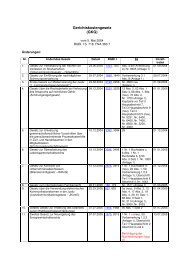The Netherlands Drug Situation 2010 - Trimbos-instituut
The Netherlands Drug Situation 2010 - Trimbos-instituut
The Netherlands Drug Situation 2010 - Trimbos-instituut
You also want an ePaper? Increase the reach of your titles
YUMPU automatically turns print PDFs into web optimized ePapers that Google loves.
National performance indicatorsAn improvement of the quality of addiction care has not only been activated by the programScoring Results, but also by the introduction of performance indicators (see ourformer National Report). Monitoring the scores on performance indicators allows organizations(of health care in general) to reflect on the state of the art of their performancesby comparing their scores with those of other organizations or with pre-determined normativevalues. Performance indicators are considered a systematic exercise in data collectionthat should result in a constant monitoring of transparent and reliable data in thelonger run.A try out of a pre-constructed basic set of performance indicators for mental health careand addiction care has been published (Keulen et al. 2009). This 'visualization' is meantas a first impression of the effectiveness, safety and client-directedness of separate organisationsin mental health care and addiction care. <strong>The</strong> draft data were published byHealth Insurers <strong>Netherlands</strong> (Zorgverzekeraars Nederland) in collaboration with theHealth Care Inspectorate (IGZ) and several umbrella organizations of professionals inthis sector. Finally, 145 of the 228 organisations that were initially approached, delivereddata to the central system, of which the data from 122 organisations were considereddetailed enough to be published. Because of many flaws in the collection and correctionof these data, and because these data are still incomplete and unreliable for comparativeanalysis, the report is considered unfit for use in decision making in mental health care.Future improvements should solve this problem.A "mirror meeting"<strong>The</strong> personal experiences that clients in addiction care have with professionals may serveas a mirror for these professionals, and are considered useful for improving daily treatmentpractices. <strong>The</strong>refore, the Jellinek has put twelve clients in the spotlights who havefollowed a similar treatment type for a first mirror meeting. 1 <strong>The</strong> clients are guided by anindependent and trained person who asks their opinions about subjects concerningtreatments, e.g. approach, communication style and perceived utility. <strong>The</strong> target is tomake their experiences explicit to the professionals who are sitting in the meeting roomas non-participating listeners. <strong>The</strong> pre-existent fear about the difficulties of chronicclients to reflect upon their experiences, appeared to be incorrect. Remarkable resultswere that clients preferred more information on treatment (modalities), that they haddifficulties with frequent changes in case managers, and that the phrasing in written educationalmaterials was often difficult to understand.5.2.3 <strong>Drug</strong>-free treatmentIn the <strong>Netherlands</strong>, 'drug-free treatment' is uncommon as an isolated treatment optionfor opiate addicts. Cannabis and stimulants problems are usually treatment with variationsof cognitive behavioural treatment and motivational enhancement. In this paragraphwe focus on recent developments in other and experimental therapies, includingMultidimensional Family <strong>The</strong>rapy (MDFT); Assertive Community Treatment (ACT) andFunction Assertive Community Treatment (FACT), which include intensive communitybasedtreatment; Deep Brain Stimulation; Minnesota Model treatment; home-basedtreatment; and internet therapy.1 www.psy.nl/psyme/psyme-nieuwsbericht65




